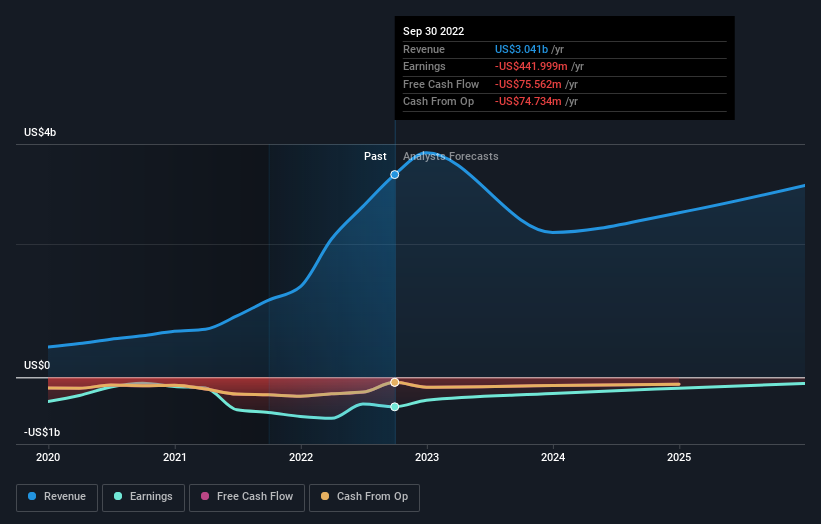- United States
- /
- Healthcare Services
- /
- NasdaqGS:CLOV
Institutions profited after Clover Health Investments, Corp.'s (NASDAQ:CLOV) market cap rose US$76m last week butindividual investors profited the most

Key Insights
- Significant control over Clover Health Investments by general public implies that this group likely has considerable sway over management and governance-related decisions
- The top 20 shareholders own 50% of the company
- Insiders own 23% of Clover Health Investments
If you want to know who really controls Clover Health Investments, Corp. (NASDAQ:CLOV), then you'll have to look at the makeup of its share registry. And the group that holds the biggest piece of the pie are individual investors with 45% ownership. That is, the group stands to benefit the most if the stock rises (or lose the most if there is a downturn).
While individual investors were the group that reaped the most benefits after last week’s 17% price gain, institutions also received a 26% cut.
Let's take a closer look to see what the different types of shareholders can tell us about Clover Health Investments.
See our latest analysis for Clover Health Investments

What Does The Institutional Ownership Tell Us About Clover Health Investments?
Institutional investors commonly compare their own returns to the returns of a commonly followed index. So they generally do consider buying larger companies that are included in the relevant benchmark index.
Clover Health Investments already has institutions on the share registry. Indeed, they own a respectable stake in the company. This suggests some credibility amongst professional investors. But we can't rely on that fact alone since institutions make bad investments sometimes, just like everyone does. If multiple institutions change their view on a stock at the same time, you could see the share price drop fast. It's therefore worth looking at Clover Health Investments' earnings history below. Of course, the future is what really matters.

We note that hedge funds don't have a meaningful investment in Clover Health Investments. Because actions speak louder than words, we consider it a good sign when insiders own a significant stake in a company. In Clover Health Investments' case, its Top Key Executive, Vivek Garipalli, is the largest shareholder, holding 18% of shares outstanding. The second and third largest shareholders are The Vanguard Group, Inc. and Greenoaks Capital Partners LLC, with an equal amount of shares to their name at 6.5%.
After doing some more digging, we found that the top 20 have the combined ownership of 50% in the company, suggesting that no single shareholder has significant control over the company.
While studying institutional ownership for a company can add value to your research, it is also a good practice to research analyst recommendations to get a deeper understand of a stock's expected performance. There are plenty of analysts covering the stock, so it might be worth seeing what they are forecasting, too.
Insider Ownership Of Clover Health Investments
The definition of an insider can differ slightly between different countries, but members of the board of directors always count. The company management answer to the board and the latter should represent the interests of shareholders. Notably, sometimes top-level managers are on the board themselves.
Insider ownership is positive when it signals leadership are thinking like the true owners of the company. However, high insider ownership can also give immense power to a small group within the company. This can be negative in some circumstances.
Our information suggests that insiders maintain a significant holding in Clover Health Investments, Corp.. Insiders own US$119m worth of shares in the US$531m company. This may suggest that the founders still own a lot of shares. You can click here to see if they have been buying or selling.
General Public Ownership
The general public-- including retail investors -- own 45% stake in the company, and hence can't easily be ignored. While this group can't necessarily call the shots, it can certainly have a real influence on how the company is run.
Private Equity Ownership
With an ownership of 6.5%, private equity firms are in a position to play a role in shaping corporate strategy with a focus on value creation. Some investors might be encouraged by this, since private equity are sometimes able to encourage strategies that help the market see the value in the company. Alternatively, those holders might be exiting the investment after taking it public.
Next Steps:
It's always worth thinking about the different groups who own shares in a company. But to understand Clover Health Investments better, we need to consider many other factors. Case in point: We've spotted 2 warning signs for Clover Health Investments you should be aware of.
But ultimately it is the future, not the past, that will determine how well the owners of this business will do. Therefore we think it advisable to take a look at this free report showing whether analysts are predicting a brighter future.
NB: Figures in this article are calculated using data from the last twelve months, which refer to the 12-month period ending on the last date of the month the financial statement is dated. This may not be consistent with full year annual report figures.
New: AI Stock Screener & Alerts
Our new AI Stock Screener scans the market every day to uncover opportunities.
• Dividend Powerhouses (3%+ Yield)
• Undervalued Small Caps with Insider Buying
• High growth Tech and AI Companies
Or build your own from over 50 metrics.
Have feedback on this article? Concerned about the content? Get in touch with us directly. Alternatively, email editorial-team (at) simplywallst.com.
This article by Simply Wall St is general in nature. We provide commentary based on historical data and analyst forecasts only using an unbiased methodology and our articles are not intended to be financial advice. It does not constitute a recommendation to buy or sell any stock, and does not take account of your objectives, or your financial situation. We aim to bring you long-term focused analysis driven by fundamental data. Note that our analysis may not factor in the latest price-sensitive company announcements or qualitative material. Simply Wall St has no position in any stocks mentioned.
About NasdaqGS:CLOV
Clover Health Investments
Provides medicare advantage plans in the United States.
Flawless balance sheet and good value.
Similar Companies
Market Insights
Community Narratives



